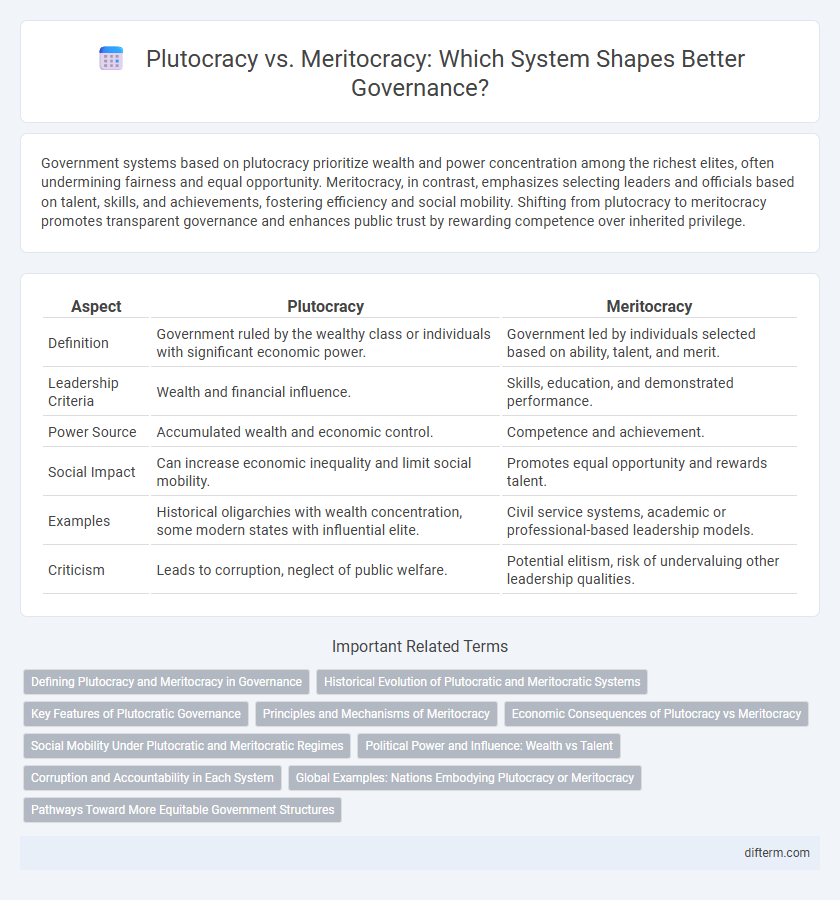Government systems based on plutocracy prioritize wealth and power concentration among the richest elites, often undermining fairness and equal opportunity. Meritocracy, in contrast, emphasizes selecting leaders and officials based on talent, skills, and achievements, fostering efficiency and social mobility. Shifting from plutocracy to meritocracy promotes transparent governance and enhances public trust by rewarding competence over inherited privilege.
Table of Comparison
| Aspect | Plutocracy | Meritocracy |
|---|---|---|
| Definition | Government ruled by the wealthy class or individuals with significant economic power. | Government led by individuals selected based on ability, talent, and merit. |
| Leadership Criteria | Wealth and financial influence. | Skills, education, and demonstrated performance. |
| Power Source | Accumulated wealth and economic control. | Competence and achievement. |
| Social Impact | Can increase economic inequality and limit social mobility. | Promotes equal opportunity and rewards talent. |
| Examples | Historical oligarchies with wealth concentration, some modern states with influential elite. | Civil service systems, academic or professional-based leadership models. |
| Criticism | Leads to corruption, neglect of public welfare. | Potential elitism, risk of undervaluing other leadership qualities. |
Defining Plutocracy and Meritocracy in Governance
Plutocracy is a form of governance where power is concentrated in the hands of the wealthy elite, influencing policy and decision-making based on economic status rather than public interest. Meritocracy emphasizes the allocation of political authority and leadership roles based on individual talent, qualifications, and achievements, promoting competence and efficiency in governance. Understanding the distinction between plutocratic and meritocratic systems is essential for evaluating how power dynamics and criteria for leadership impact democratic accountability and social equity.
Historical Evolution of Plutocratic and Meritocratic Systems
Plutocratic systems historically emerged in ancient city-states like Athens and Rome, where wealth concentrated political power, often leading to oligarchic rule supported by economic elites. Meritocratic principles evolved during the Enlightenment, emphasizing individual ability and achievement as foundations for governance, exemplified by civil service reforms in Imperial China and competitive examinations in modern bureaucracies. The transition from plutocracy to meritocracy reflects broader societal shifts towards valuing education, talent, and equitable opportunities over hereditary privilege and wealth.
Key Features of Plutocratic Governance
Plutocratic governance is characterized by the concentration of political power among the wealthiest individuals or families, often leading to policy decisions that favor economic elites over the general population. Key features include limited political participation for lower-income groups and the influence of wealth in shaping legislation, regulatory frameworks, and public resource allocation. Such systems frequently result in significant socio-economic disparities and reduced governmental transparency.
Principles and Mechanisms of Meritocracy
Meritocracy is grounded in the principle that individuals earn positions of power and responsibility based on talent, effort, and achievement rather than wealth or social status. Mechanisms such as standardized testing, transparent evaluation processes, and performance-based promotions ensure that leadership and governance roles are filled by the most capable and qualified candidates. This system contrasts with plutocracy, where political influence is concentrated among the wealthy, often undermining fairness and equal opportunity.
Economic Consequences of Plutocracy vs Meritocracy
Plutocracy tends to concentrate wealth and economic power in the hands of a few, often leading to income inequality, reduced social mobility, and market distortions that hinder overall economic growth. Meritocracy promotes resource allocation based on talent and achievement, fostering innovation, productivity, and equitable opportunities that drive sustainable economic development. Economic consequences of plutocracy include inefficient capital distribution and reduced investment in human capital, whereas meritocracy encourages optimal investment in skills and entrepreneurship.
Social Mobility Under Plutocratic and Meritocratic Regimes
Social mobility in plutocratic regimes is often constrained by wealth concentration, limiting opportunities for lower socioeconomic groups to ascend due to entrenched elite control over resources and decision-making. Meritocratic systems promote social mobility by rewarding talent and effort, enabling individuals from diverse backgrounds to access education and career advancements based on ability rather than inherited status. Data from OECD countries shows higher social mobility indices correlate with meritocratic policies emphasizing equal access to education and transparent governance.
Political Power and Influence: Wealth vs Talent
In a plutocracy, political power and influence are predominantly determined by wealth, enabling affluent individuals and corporations to shape policies and government decisions. Conversely, meritocracy allocates political authority based on talent, skills, and achievements, promoting leaders who demonstrate competence and innovation. This contrast highlights the fundamental difference in governance models where financial resources drive control versus where meritocracy prioritizes capable leadership for effective rule.
Corruption and Accountability in Each System
Plutocracy often breeds corruption due to concentrated wealth enabling elites to manipulate policies for personal gain, undermining accountability mechanisms. Meritocracy promotes accountability by rewarding competence and transparency, reducing opportunities for corrupt practices through performance-based governance. However, meritocratic systems require robust oversight to prevent elitism and ensure equitable access to opportunities.
Global Examples: Nations Embodying Plutocracy or Meritocracy
Nations like the United States and Russia often illustrate plutocracy, where wealth concentration significantly influences political power and policy-making. In contrast, countries such as Singapore and Finland exemplify meritocracy, prioritizing talent, education, and performance in governmental appointments and societal advancement. These global examples highlight the impact of governance models on economic equality and social mobility.
Pathways Toward More Equitable Government Structures
Plutocracy concentrates power in the hands of the wealthy elite, undermining democratic principles and limiting access to political influence for marginalized groups. Meritocracy promotes governance based on ability and talent, fostering inclusivity and fairer representation through transparent criteria for leadership selection. Developing pathways toward equitable government structures involves implementing policies that reduce economic disparities, expand educational opportunities, and enhance civic participation to balance merit-based advancement with social justice.
Plutocracy vs Meritocracy Infographic

 difterm.com
difterm.com